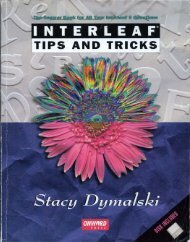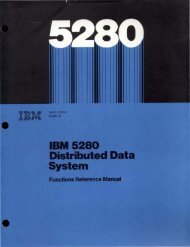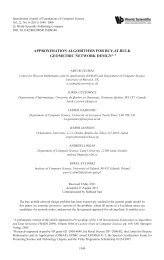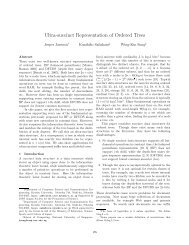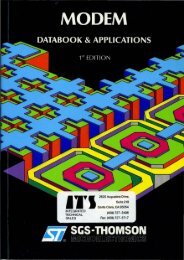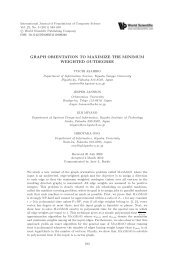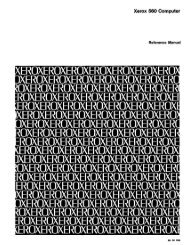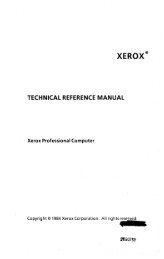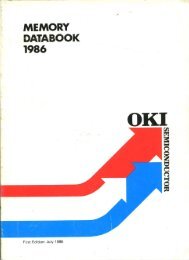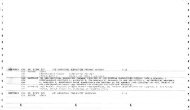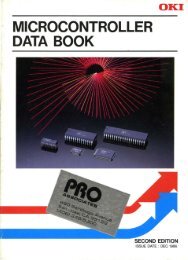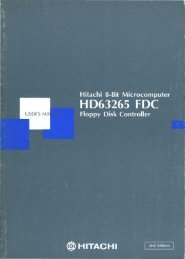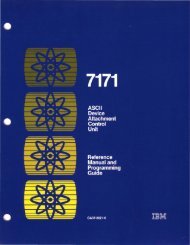- Page 3 and 4:
DSP56K FAMILY INTRODUCTIONDSP56K CE
- Page 5:
Motorola reserves the right to make
- Page 8 and 9:
Table of Contents (Continued)Paragr
- Page 10 and 11:
ParagraphNumberTable of Contents (C
- Page 13 and 14:
FigureNumberList of Figures (Contin
- Page 15:
List of Tables (Continued)TablePage
- Page 19 and 20:
1.1 INTRODUCTIONThe DSP56K family i
- Page 21 and 22:
Fewer componentsStable, determinist
- Page 23 and 24:
Digital FilteringFinite Impulse Res
- Page 25 and 26:
architecture matches the shape of t
- Page 27 and 28:
• DSP56001 Compatibility - All me
- Page 29:
SECTION 2DSP56K CENTRAL ARCHITECTUR
- Page 32 and 33:
--I«a:w:ca.ffi~a. a.24-Bit 56KModu
- Page 34 and 35:
-rectly addressable registers: the
- Page 37 and 38:
3.1 DATA ARITHMETIC LOGIC UNITThis
- Page 39 and 40:
3.2.1 Data ALU Input Registers (X1,
- Page 41 and 42:
"""""" 24 BITS;:~:>~~::~~~:~:~:~:::
- Page 43 and 44:
3.2.4 Accumulator ShifterThe accumu
- Page 45 and 46:
Table 3-1 Limited Data ValuesDestin
- Page 47 and 48:
_--- N BITS ---_TWOS COMPLEMENT INT
- Page 49 and 50:
CASE I: IF AO < $800000 (1/2), THEN
- Page 51 and 52:
one instruction cycle. The ANDI ins
- Page 53:
3.5 DATA ALU PROGRAMMING MODELThe D
- Page 57 and 58:
4.1 ADDRESS GENERATION UNIT AND ADD
- Page 59 and 60:
!---LOWADDRESS ALU -----I~.j.I.....
- Page 61 and 62:
•••••••• _ ........
- Page 63 and 64:
4.4.1 Address Register Indirect Mod
- Page 65 and 66:
EXAMPLE: MOVE BO,V: (R1)+BEFORE EXE
- Page 67 and 68:
EXAMPLE: MOVE X1,X: (R2)+N2BEFORE E
- Page 69 and 70:
EXAMPLE: MOVE Y1,X: (RS+NS)BEFORE E
- Page 71 and 72:
Table 4-2 Address Modifier SummaryM
- Page 73 and 74:
ADDRESS -f-_POINTERUPPER BOUNDARYiM
- Page 75 and 76:
EXAMPLE: MOVE XO,X:(R2)+NLET:M2 00
- Page 77 and 78:
oundary gives a 16-bit binary numbe
- Page 79 and 80:
4.4.2.4 Address-Modifier-Type Encod
- Page 81:
SECTION 5PROGRAM CONTROL UNIT-
- Page 84 and 85:
X MEMORYRAM/ROMIII E:XPAf'JSIC)N LI
- Page 86 and 87:
interruptible since they are fetche
- Page 88 and 89:
PROGRAM CONTROL UNIT-23 1615 023 16
- Page 90 and 91:
The GGR is a special purpose contro
- Page 92 and 93:
If S 1 =0 and SO=O (no scaling)then
- Page 94 and 95:
-23 876543210I * 1* JSO I * I Mel y
- Page 96 and 97:
5.4.5.1 Stack Pointer (Bits 0-3)The
- Page 98 and 99:
-DATA ARITHMETIC LOGIC UNITINPUT RE
- Page 101 and 102:
6.1 INSTRUCTION SET INTRODUCTIONThe
- Page 103 and 104:
shown in Figure 6-2. Most instructi
- Page 105 and 106:
23 87 0L...-I ___-'-I_---'I BUS~ LS
- Page 107 and 108:
The MR and CCR may be accessed indi
- Page 109 and 110:
6.3.4 Operand ReferencesThe DSP sep
- Page 111 and 112:
Some address register indirect mode
- Page 113 and 114:
EXAMPLE A: IMMEDIATE INTO 24-BIT RE
- Page 115 and 116:
EXAMPLE A: IMMEDIATE SHORT INTO AO,
- Page 117 and 118:
EXAMPLE A: MOVE P: $3200,XOBEFORE E
- Page 119 and 120:
Table 6-1 Addressing Modes SummaryA
- Page 121 and 122:
6.4.2 LogicallnstructlonsThe logica
- Page 123 and 124:
START OF LOOP1)SP+ 1 • SP; LA. SS
- Page 125 and 126:
OPCODE/OPERANDSPARALLEL MOVE EXAMPL
- Page 127:
SECTION 7PROCESSING STATES-
- Page 130 and 131:
Each instruction requires a minimum
- Page 132 and 133:
second instruction of the downloade
- Page 134 and 135:
The DO instruction is another instr
- Page 136 and 137:
SP and SSH/SSL register manipulatio
- Page 138 and 139:
7.3.1 Interrupt TypesThe DSP56K rel
- Page 140 and 141:
Table 7-2 Status Register Interrupt
- Page 142 and 143:
7.3.3 Interrupt SourcesInterrupts c
- Page 144 and 145:
interrupts makes it very useful for
- Page 146 and 147:
MAINPROGRAMFETCHESLONG INTERRUPTSER
- Page 148 and 149:
7.3.3.3 Other Interrupt SourcesOthe
- Page 150 and 151:
7.3.4 Interrupt ArbitrationInterrup
- Page 152 and 153:
7.3.7 Interrupt Instruction Executi
- Page 154 and 155:
MAINPROGRAMMEMORYINTERRUPT SYNCHRON
- Page 156 and 157:
MAINPROGRAMFETCHESINTERRUPTSYNCHRON
- Page 158 and 159:
MAINPROGRAMFAST INTERRUPTVECTORLONG
- Page 160 and 161:
MAINPROGRAMFETCHESNTERRUPTSYN8HRCNZ
- Page 162 and 163:
7.5 WAIT PROCESSING STATEThe WAIT i
- Page 164 and 165:
The stop processing state halts all
- Page 166 and 167:
the first instruction fetch). If th
- Page 168:
RESET -----------------------------
- Page 172 and 173:
16 - BIT INTERNALADDRESS BUSESX ADD
- Page 174 and 175:
8.2.2.1 Address (AO-A15)These three
- Page 177:
SECTION 9PLL CLOCK OSCILLATOR-
- Page 180 and 181:
X MEMORYRAM/ROMEXPANSION24-Bit56KMo
- Page 182 and 183:
23 22 21 20 19 18 17 16 15 14 13 12
- Page 184 and 185:
cleared. To enable rapid recovery w
- Page 186 and 187:
-CLVCCVCC for the CKOUT output. The
- Page 188 and 189:
4. For all input frequencies which
- Page 190 and 191:
While the PLL is regaining lock, th
- Page 193 and 194:
10.1 ON-CHIP EMULATION INTRODUCTION
- Page 195 and 196:
10.2.2 Debug Serial Clock/Chip Stat
- Page 197 and 198:
76543210I R/W I GO I EX I RS41 RS31
- Page 199 and 200:
shifted in (so a new command is ava
- Page 201 and 202:
10.3.4.4 Software Debug Occurrence
- Page 203 and 204:
10.4.4 Memory High Address Comparat
- Page 205 and 206:
10.6.1 External Debug Request Durin
- Page 207 and 208:
PABCIRCULARBUFFERPOINTERDSCKDSOFigu
- Page 209 and 210:
are serially available to the exter
- Page 211 and 212:
k. ACKI. ClKm. Send command READ FI
- Page 213 and 214:
19. ACK20. Send command READ GDB RE
- Page 215 and 216:
10.11.6.1 Case 1: Return To The Pre
- Page 217:
SECTION 11ADDITIONAL SUPPORTDr. BuB
- Page 220 and 221:
The following is a partial list of
- Page 222 and 223:
• In-line assembler language code
- Page 224 and 225:
I Document 10 I Version Synopsis I
- Page 226 and 227:
I Document 10 I Version Synopsis I
- Page 228 and 229:
I Document ID I Version Synopsis I
- Page 230 and 231:
I Document 10 I Version Synopsis I
- Page 232 and 233:
11.5 MOTOROLA DSP NEWSThe Motorola
- Page 234 and 235:
DIGITAL SIGNAL PROCESSINGAlan V. Op
- Page 236 and 237:
C Programming Language:Controls:. C
- Page 238 and 239:
Image Processing:DIGITAL IMAGE PROC
- Page 240 and 241:
LINEAR PREDICTION OF SPEECHJ. D. Ma
- Page 243 and 244:
A.1 APPENDIX A INTRODUCTIONThis app
- Page 245 and 246:
XnYnTable A-1 Instruction Descripti
- Page 247 and 248:
Table A-1 Instruction Description N
- Page 249 and 250:
Table A-1 Instruction Description N
- Page 251 and 252:
Table A-2 DSP56K Addressing ModesAd
- Page 253 and 254:
The address register indirect addre
- Page 255 and 256:
A.SCONDITION CODE COMPUTATION15 14
- Page 257 and 258:
S1 SO Scaling Mode Signed Integer P
- Page 259 and 260:
Table A-5 Condition Code Computatio
- Page 261 and 262:
A.7 INSTRUCTION DESCRIPTIONSThe fol
- Page 263 and 264:
ABSAbsolute ValueABSInstruction For
- Page 265 and 266:
ADC Add Long with Carry ADCresult.
- Page 267 and 268:
ADD Add ADDCondition Codes:15 14 13
- Page 269 and 270:
ADDL Shift Left and Add Accumulator
- Page 271 and 272:
ADDR Shift Right and Add Accumulato
- Page 273 and 274:
ANDLogical ANDANDInstruction Format
- Page 275 and 276:
ANDIAND Immediate with Control Regi
- Page 277 and 278:
ASL Arithmetic Shift Accumulator Le
- Page 279 and 280:
ASR Arithmetic Shift Accumulator Ri
- Page 281 and 282:
BCHG Bit Test and Change BCHGExplan
- Page 283 and 284:
BCHGBit Test and ChangeBCHGInstruct
- Page 285 and 286:
BCHGBit Test and ChangeBCHGInstruct
- Page 287 and 288:
BCHG Bit Test and Change BCHGNotes:
- Page 289 and 290:
BCLR Bit Test and Clear BCLRExplana
- Page 291 and 292:
BClRBit Test and ClearBClRInstructi
- Page 293 and 294:
BClRBit Test and ClearBClRInstructi
- Page 295 and 296:
BClR Bit Test and Clear BClRNotes:
- Page 297 and 298:
BSET Bit Test and Set BSETExplanati
- Page 299 and 300:
BSETBit Test and SetBSETInstruction
- Page 301 and 302:
BSETBit Test and SetBSETInstruction
- Page 303 and 304:
BSET Bit Test and Set BSETNotes: If
- Page 305 and 306:
BTSTBit TestBTSTCondition Codes:115
- Page 307 and 308:
8TSTBit Test8TSTInstruction Format:
- Page 309 and 310:
8TSTBit Test8TSTInstruction Format:
- Page 311 and 312:
CLRClear AccumulatorCLRInstruction
- Page 313 and 314:
CMP Compare CMPCondition Codes:15 1
- Page 315 and 316:
CMPM Compare Magnitude CMPMConditio
- Page 317 and 318:
DEBUGEnter Debug ModeDEBUGOpcode:23
- Page 319 and 320:
DEBUGcc Enter Debug Mode Conditiona
- Page 321 and 322:
DEC Decrement by One DECInstruction
- Page 323 and 324:
DIV Divide Interation DIVThe DIV in
- Page 325 and 326:
DIV Divide Interation DIVNote that
- Page 327 and 328:
DIVInstruction Format:DIV S,DDivide
- Page 329 and 330:
DO Start Hardware Loop DOexecuted 6
- Page 331 and 332:
DOStart Hardware LoopDOAt LAOther R
- Page 333 and 334:
DOStart Hardware LoopDOInstruction
- Page 335 and 336:
DOStart Hardware LoopDOInstruction
- Page 337 and 338:
DO Start Hardware Loop DONotes: If
- Page 339 and 340:
ENDDO End Current DO Loop ENDDOExpl
- Page 341 and 342:
EOR Logical Exclusive OR EORInstruc
- Page 343 and 344:
ILLEGALIllegal Instruction Interrup
- Page 345 and 346:
INC Increment by One INCInstruction
- Page 347 and 348:
Jcc Jump Conditionally JccRestricti
- Page 349 and 350:
JccJump ConditionallyJccEffectiveAd
- Page 351 and 352:
JCLR Jump If Bit Clear JCLRRestrict
- Page 353 and 354:
JCLRJump If Bit ClearJCLRInstructio
- Page 355 and 356:
JCLR Jump If Bit Clear JCLRInstruct
- Page 357 and 358:
JMPJumpJMPInstruction Fields:xxx=12
- Page 359 and 360:
JSccJump to Subroutine Conditionall
- Page 361 and 362:
JScc Jump to Subroutine Conditional
- Page 363 and 364:
JSCLR Jump to Subroutine if Bit Cle
- Page 365 and 366:
JSCLRJump to Subroutine If Bit Clea
- Page 367 and 368:
JSCLRJump to Subroutine If Bit Clea
- Page 369 and 370:
JSCLR Jump to Subroutine If Bit Cle
- Page 371 and 372:
JSET Jump if Bit Set JSETRestrictio
- Page 373 and 374:
JSETJump if Bit SetJSETInstruction
- Page 375 and 376:
JSET Jump If Bit Set JSETInstructio
- Page 377 and 378:
JSR Jump to Subroutine JSRInstructi
- Page 379 and 380:
JSSET Jump to Subroutine if Bit Set
- Page 381 and 382:
JSSETJump to Subroutine if Bit SetJ
- Page 383 and 384:
JSSET Jump to Subroutine if Bit Set
- Page 385 and 386:
LSL Logical Shift Left LSLCondition
- Page 387 and 388:
LSR Logical Shift Right LSRConditio
- Page 389 and 390:
LUALoad Updated AddressLUACondition
- Page 391 and 392:
MAC Signed Multiply-Accumulate MACC
- Page 393 and 394:
MACSigned Multiply-AccumulateMACTim
- Page 395 and 396:
MACR Signed Multiply-Accumulate and
- Page 397 and 398:
MACR Signed MUltiply-Accumulate and
- Page 399 and 400:
MOVE Move Data MOVEExplanation of E
- Page 401 and 402:
MOVE Move Data MOVEWhen a 56-bit ac
- Page 403 and 404:
No Parallel Data MoveInstruction Fo
- Page 405 and 406:
I Immediate Short Data Move IExampl
- Page 407 and 408:
I Immediate Short Data Move IDDD d
- Page 409 and 410:
R Register to Register Data Move RE
- Page 411 and 412:
R Register to Register Data Move RI
- Page 413 and 414:
uAddress Register UpdateuInstructio
- Page 415 and 416:
X: X Memory Data Move X:Note:Due to
- Page 417 and 418:
X: X Memory Data Move X:S D DS,D d
- Page 419 and 420:
X: X Memory Data Move X:S D DS,D d
- Page 421 and 422:
X:R X Memory and Register Data Move
- Page 423 and 424:
X:R X Memory and Register Data Move
- Page 425 and 426:
X:R X Memory and Register Data Move
- Page 427 and 428:
Y: Y Memory Data Move Y:Note: This
- Page 429 and 430:
Y: Y Memory Data Move Y:S D DS,D d
- Page 431 and 432:
Y: Y Memory Data Move Y:S D DS,D d
- Page 433 and 434:
R:V Register and V Memory Data Move
- Page 435 and 436:
R:V Register and Y Memory Data Move
- Page 437 and 438:
R:V Register and Y Memory Data Move
- Page 439 and 440:
L: Long Memory Data Move L:Example:
- Page 441 and 442:
L: Long Memory Data Move L:Instruct
- Page 443 and 444:
X: Y: xv Memory Data Move X: Y:Exam
- Page 445 and 446:
X: Y: xv Memory Data Move X: Y:S1 D
- Page 447 and 448:
MOVEC Move Control Register MOVECst
- Page 449 and 450:
MOVEC Move Control Register MOVECCo
- Page 451 and 452:
MOVECMove Control RegisterMOVECInst
- Page 453 and 454:
MOVEC Move Control Register MOVECTi
- Page 455 and 456:
MOVEM Move Program Memory MOVEMoper
- Page 457 and 458:
MOVEM Move Program Memory MOVEMInst
- Page 459 and 460:
MOVEMMove Program MemoryMOVEMInstru
- Page 461 and 462:
MOVEP Move Peripheral Data MOVEPist
- Page 463 and 464:
MOVEP Move Peripheral Data MOVEPCon
- Page 465 and 466:
MOVEP Move Peripheral Data MOVEPIns
- Page 467 and 468:
MOVEP Move Peripheral Data MOVEPIns
- Page 469 and 470:
MPY Signed Multiply MPYExplanation
- Page 471 and 472:
MPY Signed Multiply MPYInstruction
- Page 473 and 474:
MPYR Signed Multiply and Round MPYR
- Page 475 and 476:
MPYR Signed Multiply and Round MPYR
- Page 477 and 478:
NEGNegate AccumulatorNEGInstruction
- Page 479 and 480:
NOPNo OperationNOPInstruction Forma
- Page 481 and 482:
NORM Normalize Accumulator Iteratio
- Page 483 and 484:
NOTLogical ComplementNOTInstruction
- Page 485 and 486:
ORLogical Inclusive ORORInstruction
- Page 487 and 488: ORI OR Immediate with Control Regis
- Page 489 and 490: REP Repeat Next Instruction REPRest
- Page 491 and 492: REPRepeat Next InstructionREPInstru
- Page 493 and 494: REPRepeat Next InstructionREPInstru
- Page 495 and 496: REP Repeat Next Instruction REPNote
- Page 497 and 498: RESETReset On-Chip Peripheral Devic
- Page 499 and 500: RND Round Accumulator RNDConvergent
- Page 501 and 502: RNDRound AccumulatorRNDInstruction
- Page 503 and 504: ROL Rotate Left ROLCondition Codes:
- Page 505 and 506: ROR Rotate Right RORCondition Codes
- Page 507 and 508: RTIReturn from InterruptRTIConditio
- Page 509 and 510: RTSReturn from SubroutineRTSInstruc
- Page 511 and 512: sec Subtract Long with Carry secExp
- Page 513 and 514: secSubtract Long with CarrysecInstr
- Page 515 and 516: STOPStop Instruction ProcessingSTOP
- Page 517 and 518: SUB Subtract SUBCondition Codes:S -
- Page 519 and 520: SUBL Shift Left and Subtract Accumu
- Page 521 and 522: SUBR Shift Right and Subtract Accum
- Page 523 and 524: SWISoftware InterruptSWICondition C
- Page 525 and 526: Tee Transfer Conditionally Teetion
- Page 527 and 528: Tee Transfer Conditionally TeeInstr
- Page 529 and 530: TFR Transfer Data ALU Register TFRC
- Page 531 and 532: TSTTest AccumulatorTSTInstruction F
- Page 533 and 534: WAIT Wait for Interrupt WAITConditi
- Page 535 and 536: including the number of words per i
- Page 537: 5. Compute final results.Thus, base
- Page 541 and 542: Table A-6 Instruction Timing Summar
- Page 543 and 544: Note that the "ap" term in Table A-
- Page 545 and 546: Table A-14 Memory Access Timing Sum
- Page 547 and 548: Other RestrictionsDO SSH,xxxxJSR to
- Page 549 and 550: Immediately before MOVEC from SSH o
- Page 551 and 552: A.9.S REP RestrictionsThe REP instr
- Page 553 and 554: Table A-18 Triple-Bit Register Enco
- Page 555 and 556: Table A-24 Program Control Unit Reg
- Page 557 and 558: R: Register to Register Parallel Da
- Page 559 and 560: JSSETJSSET#n,X:pp,XXXX#n,Y:pp,xxxx2
- Page 561 and 562: JSSET#n,S,xxxx23 16 15 87 000001011
- Page 563 and 564: BCHGBCHG#n,X:aa#n,Y:aa23 16 15 87 0
- Page 565 and 566: MOVE(M)MOVE(M)S,P:aaP:aa,DREP #XXXR
- Page 567 and 568: LUAea,O23 16 15 87 0I 0 0 0 0 0 1 0
- Page 569 and 570: ENDDO23 16 15 87 00 0 0 0 0 0 0 o 1
- Page 571 and 572: Table A-28 Operation Code QQQ Decod
- Page 573 and 574: Table A-30 Special Case #10 P E R C
- Page 575 and 576: NEGD23 87 43 0DATA BUS MOVE FIELDLS
- Page 577: ADDRS,D23 87 43 oDATA BUS MOVE FIEL
- Page 580 and 581: lEI
- Page 582 and 583: Table 8-1 27-MHz Benchmark Results
- Page 584 and 585: .*._---*-----*-------**-------....
- Page 586 and 587: ;Latest Revision - September 30, 19
- Page 588 and 589:
All coefficients are divided by 2:w
- Page 590 and 591:
Real input FFT based on Glenn Bergl
- Page 592 and 593:
countountcountcountorg y:coefset 0d
- Page 594 and 595:
; Real-Valued FFT for MOTOROLA DSP5
- Page 596 and 597:
; first group in the last passmove
- Page 599 and 600:
A Accumulator ....... ' ...........
- Page 601 and 602:
-H- fast ..........................
- Page 603 and 604:
PGND ..............................
- Page 605 and 606:
DSP56K FAMILY INTRODUCTIONDSP56K CE



